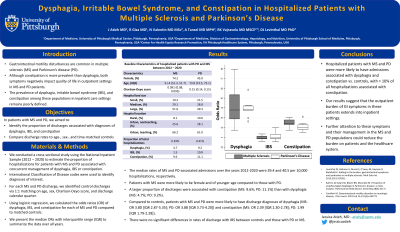Monday Poster Session
Category: Functional Bowel Disease
P1958 - Dysphagia, Irritable Bowel Syndrome, and Constipation in Hospitalized Patients With Multiple Sclerosis and Parkinson’s Disease
Monday, October 23, 2023
10:30 AM - 4:15 PM PT
Location: Exhibit Hall

Has Audio

Jessica Atieh, MD
University of Pittsburgh Medical Center
Pittsburgh, PA
Presenting Author(s)
Jessica Atieh, MD1, Nelson Valentin, MD2, Aylin Tansel, MD, MPH1, Ravy Vajravelu, MD, MSCE3, David J.. Levinthal, MD, PhD1
1University of Pittsburgh Medical Center, Pittsburgh, PA; 2UPMC, Pittsburgh, PA; 3University of Pittsburgh, Pittsburgh, PA
Introduction: Gastrointestinal motility disturbances are increasingly recognized in patients with multiple sclerosis (MS) and Parkinson’s disease (PD). While constipation is more prevalent in MS and PD compared to dysphagia, both negatively impact quality of life in outpatient settings. However, the relative impact of constipation, irritable bowel syndrome (IBS), and dysphagia in MS and PD populations in inpatient care is unclear. We aimed to identify the proportion of discharges associated with dysphagia, IBS, and constipation in patients with MS and PD and to compare these rates to controls.
Methods: Using the National Inpatient Sample (2012-2020), we conducted a cross-sectional study to estimate the proportion of hospitalizations for MS and PD with concurrent management of dysphagia, IBS, or constipation. We identified the diagnoses using International Classification of Disease codes located in any diagnostic position. For each MS and PD discharge, we identified control discharges by 1:1 matching on age, sex, Charlson-Deyo score, and discharge quarter. Using logistic regression, we calculated the odds ratios (OR) of inpatient management of dysphagia, IBS, and constipation for each of MS and PD compared to matched controls. To summarize the data over all years, we presented median OR from 2012-2020 with interquartile range (IQR).
Results: From 2012-2020, the median rate of MS and PD were 39.4 and 40.5 per 10,000 hospitalizations, respectively. Patients with MS were more likely to be female and younger compared to those with PD (Table 1). Overall, a larger proportion of these discharges were associated with constipation (MS: 9.6%; PD: 11.1%) than with dysphagia (MS: 4.7%; PD: 9.2%). Compared to controls, patients with MS or PD were more likely to have discharge diagnoses of dysphagia (MS: OR 3.80 [IQR 2.87-5.35]; PD: OR 3.88 [IQR 3.73-4.20]) and constipation (MS: OR 2.39 [IQR 2.30-2.78]; PD: 1.99 [IQR 1.79-2.28]) (Figure 1). There were no significant differences in rates of discharges with IBS between controls and those with PD or MS.
Discussion: Hospitalized patients with MS and PD were more likely to have admissions associated with dysphagia and constipation compared to controls, with ~10% of all hospitalizations involving constipation. Our results suggest that the burden of GI symptoms in the MS and PD population extend into inpatient settings. Further attention to these symptoms and their management in the MS and PD populations could reduce the burden on patients and the healthcare system.

Disclosures:
Jessica Atieh, MD1, Nelson Valentin, MD2, Aylin Tansel, MD, MPH1, Ravy Vajravelu, MD, MSCE3, David J.. Levinthal, MD, PhD1. P1958 - Dysphagia, Irritable Bowel Syndrome, and Constipation in Hospitalized Patients With Multiple Sclerosis and Parkinson’s Disease, ACG 2023 Annual Scientific Meeting Abstracts. Vancouver, BC, Canada: American College of Gastroenterology.
1University of Pittsburgh Medical Center, Pittsburgh, PA; 2UPMC, Pittsburgh, PA; 3University of Pittsburgh, Pittsburgh, PA
Introduction: Gastrointestinal motility disturbances are increasingly recognized in patients with multiple sclerosis (MS) and Parkinson’s disease (PD). While constipation is more prevalent in MS and PD compared to dysphagia, both negatively impact quality of life in outpatient settings. However, the relative impact of constipation, irritable bowel syndrome (IBS), and dysphagia in MS and PD populations in inpatient care is unclear. We aimed to identify the proportion of discharges associated with dysphagia, IBS, and constipation in patients with MS and PD and to compare these rates to controls.
Methods: Using the National Inpatient Sample (2012-2020), we conducted a cross-sectional study to estimate the proportion of hospitalizations for MS and PD with concurrent management of dysphagia, IBS, or constipation. We identified the diagnoses using International Classification of Disease codes located in any diagnostic position. For each MS and PD discharge, we identified control discharges by 1:1 matching on age, sex, Charlson-Deyo score, and discharge quarter. Using logistic regression, we calculated the odds ratios (OR) of inpatient management of dysphagia, IBS, and constipation for each of MS and PD compared to matched controls. To summarize the data over all years, we presented median OR from 2012-2020 with interquartile range (IQR).
Results: From 2012-2020, the median rate of MS and PD were 39.4 and 40.5 per 10,000 hospitalizations, respectively. Patients with MS were more likely to be female and younger compared to those with PD (Table 1). Overall, a larger proportion of these discharges were associated with constipation (MS: 9.6%; PD: 11.1%) than with dysphagia (MS: 4.7%; PD: 9.2%). Compared to controls, patients with MS or PD were more likely to have discharge diagnoses of dysphagia (MS: OR 3.80 [IQR 2.87-5.35]; PD: OR 3.88 [IQR 3.73-4.20]) and constipation (MS: OR 2.39 [IQR 2.30-2.78]; PD: 1.99 [IQR 1.79-2.28]) (Figure 1). There were no significant differences in rates of discharges with IBS between controls and those with PD or MS.
Discussion: Hospitalized patients with MS and PD were more likely to have admissions associated with dysphagia and constipation compared to controls, with ~10% of all hospitalizations involving constipation. Our results suggest that the burden of GI symptoms in the MS and PD population extend into inpatient settings. Further attention to these symptoms and their management in the MS and PD populations could reduce the burden on patients and the healthcare system.

Figure: Figure 1: Odds ratio of gastrointestinal symptoms as discharge diagnoses in patients with multiple sclerosis and Parkinson’s disease compared to controls. IBS: irritable bowel syndrome
Disclosures:
Jessica Atieh indicated no relevant financial relationships.
Nelson Valentin indicated no relevant financial relationships.
Aylin Tansel indicated no relevant financial relationships.
Ravy Vajravelu indicated no relevant financial relationships.
David Levinthal: Aditum Pharmaceuticals – Consultant. Alexza Pharmaceuticals – Consultant. BYOMass – Consultant. Takeda Pharmaceuticals – Consultant.
Jessica Atieh, MD1, Nelson Valentin, MD2, Aylin Tansel, MD, MPH1, Ravy Vajravelu, MD, MSCE3, David J.. Levinthal, MD, PhD1. P1958 - Dysphagia, Irritable Bowel Syndrome, and Constipation in Hospitalized Patients With Multiple Sclerosis and Parkinson’s Disease, ACG 2023 Annual Scientific Meeting Abstracts. Vancouver, BC, Canada: American College of Gastroenterology.
